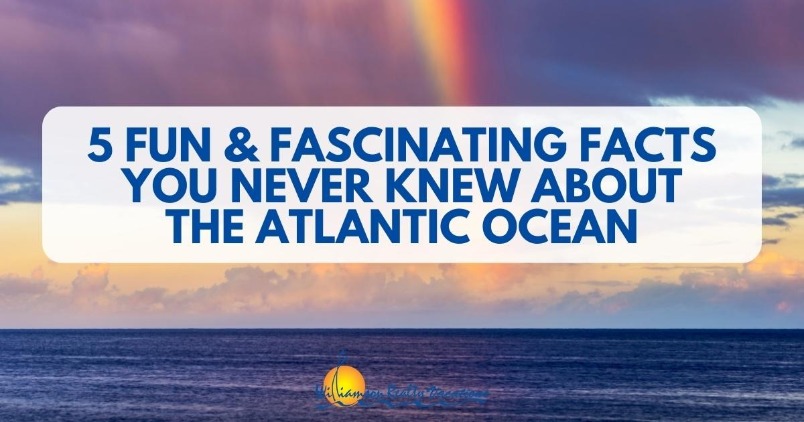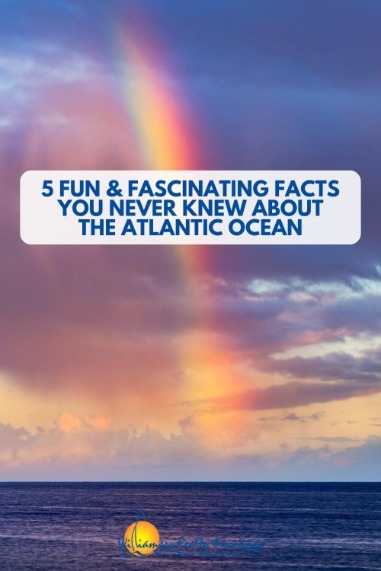
Ocean Isle Beach vacations are a great time to brush up on your history and science skills. Don’t worry, it’s perfectly acceptable to use your vacation destination as an opportunity to learn! Why not share a few of these Atlantic Ocean fun facts and trivia with your family on your way to OIB, while hanging out in your Ocean Isle Beach rental, or even while you’re basking on the beach? Don’t forget to check out our link at the bottom of this post, too, which features fun facts about Ocean Isle Beach and other local information you may not know. Here you go!
1. Why It’s Called the Atlantic Ocean
So why the name Atlantic and what does it mean? The word “Atlantic”, or rather “Atlantikos” in Greek, literally means the ‘sea of Atlas’. In Greek mythology, Atlas is the Titan tasked with holding up the heavens for all eternity.
According to modern etymology, the term initially referred to North Africa’s Atlas Mountains and its adjoining seas—and was only later extended to the whole ocean.
Over time, the Atlantic has gone by several other names as well including the ‘Great Western Ocean’, ‘Ocean Sea’ and others. Today, describing it as ‘the pond’ is a popular colloquialism of the English-speaking world that resides on both sides of the ocean (or the pond!).
2. Atlantic Coastline Countries & Islands
Including the countries in Europe, Africa and the Americas, 52 different nations in total have shorelines along the Atlantic. The Atlantic Ocean is almost equally divided by the equator into The North and The South Atlantic, and both cover roughly the same surface area.
The Atlantic is also home to some of the biggest islands on earth, including the biggest, Greenland. Other large islands include Ireland, Great Britain and Cuba.
However, compared to other major oceans in the world, the Atlantic actually has fewer islands—most of which are volcanic in origin and are found in their greatest concentration around the Caribbean Sea region. The Pacific Ocean, in contrast, contains over 25,000 islands.
3. The Saltiest Ocean of Them All
Among all the oceans in the world, the Atlantic Ocean is the saltiest. The Antarctic ice sheet and global mountain ranges cause these high salinity levels. So now you can brag to your friends about vacationing on the beaches of the world’s saltiest oceans during your stay in Ocean Isle Beach.
4. Notable (and Questionable) Atlantic Ocean Crossings
The Atlantic is the world’s first major ocean to be crossed by both ship and airplane. But of course, it all started with Christopher Columbus. The wayward Italian explorer became the first man in history to make a transatlantic voyage from Europe all the way to America. Eventually, he ended up completing four voyages across the ocean.
In September 1620, a batch of English Puritans set sail to America on a 66-day voyage. This was a landmark journey across the Atlantic as it set into motion the famous 20-year period now known as the ‘Great Migration’ where more than 20,000 English fled their fatherland to escape religious persecution and ended up settling down at the modern day New England.
Here are a few more notable historic voyages across the Atlantic:
- The first steamship to cross the Atlantic, in 1819, was theSS Savannah.This was an American sidewheel steamer/sailing ship hybrid.
- In 1850s, Cunard Line became the first company to make transatlantic voyages with passengers aboard, although it was not a commercial success.
- In 1870, Nikola Primorac di Costa and John Charles Buckley were the first persons to cross the Atlantic on a lifeboat. They began their journey in Queenstown, Ireland and landed in Boston, Massachusetts.
- In 1896, George Harbo and Frank Samuelsen from Norway became the first ever individuals to row their way across the Atlantic Ocean.
5. The Titanic, the Atlantic & Iceberg Alley
One section in the northwestern Atlantic is known as ‘Iceberg Alley’ for the great number of icebergs in that area that pose considerable risks to ships that journey through there. Having broken off from Arctic glaciers, these icebergs made their way down to the North Atlantic Ocean over a long period of time.
We all know the story of the ocean liner RMS Titanic that sank on its maiden voyage across the Atlantic as a result of a collision with a huge iceberg. But did you know that experts believe that iceberg began its southwards journey from the Arctic Seas over 3,000 years prior? This dates it back to the time of King Tutankhamen! Crazy. That iceberg did not live long after that fateful day, though. It had already veered off too far to the south, and as a result, melted away about two years after the sinking of the Titanic.
Do you love these cool facts about the Atlantic Ocean? You can read plenty more of them here. Also, check out the video below for more fun facts about the Atlantic. ⤵
Do you have any fun facts about the atlantic Ocean to Share?
Drop them in the comments section below. We want to know!



